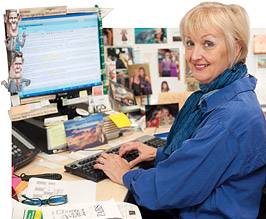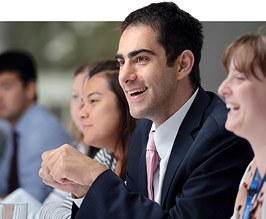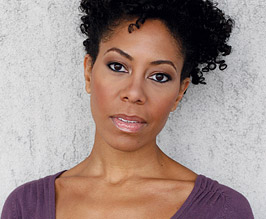
Copy-editing Washington

Judy Shapleigh, W’72
Edward or Ted Kennedy? Sen. Nelson of Nebraska or Sen. Nelson of Florida? Was Specter or Franken the 60th vote for the Affordable Health Care Act?
Those are just some of the calls Judy Shapleigh has to make with speed and accuracy as the chief of Politico’s copy desk.
At a time when most newspapers are cutting staff, D.C.-based Politico is booming, thanks in part to a growing national obsession with an insider’s view of politics. Shapleigh signed on at Politico nearly four years ago after three decades at U.S. News & World Report.
Going from a weekly magazine to one that publishes five days a week when Congress is in session has been a “shocking change,” she says. Daily blog posts and online stories also add more copy to proof. Conventions. Elections. Inaugurations. Policy speeches. The 2012 election was her first presidential campaign at Politico and continued the frantic pace.
“To just go into politics, I had a lot to learn,” Shapleigh says. “It’s either gonna kill me or it’s gonna keep me young. It’s a really stimulating place to work.”
Shapleigh manages the paper’s style guide and fact-checks candidate and lawmaker names, home states, committee appointments, party affiliations, and esoteric nuances about Capitol Hill scandals. She memorized hundreds of names and facts so she can easily spot errors in copy.
To help reporters, Shapleigh writes a blog on style and usage and wrote a grammar guide called Perilous Pairs, detailing words that confuse writers. Being correct and consistent in style is important for a news organization, she says, because “you want people to trust you.”
“The work is never done,” she says. “You become addicted to politics. I guess most of the people here are obsessed. You put out the paper, come home and watch the debates and coverage, and read copy online for another hour as people are blogging. It’s a long day.”
—Catherine Amos
Minding the gap

Brett Wigdortz, ’95
Brett Wigdortz walked into one of the largest secondary schools in West London as a consultant for a pro bono project on how businesses could better support disadvantaged schools.
He walked out knowing there was much more he could do.
Wigdortz had no experience with education or public policy. He had only recently moved to Britain and had no professional network. But he had a vision for improving school performance: recruit students with leadership potential, have them complete a residential training program, and ask them to make a two-year commitment to teaching. In 2002, Wigdortz resigned from his consulting job to found Teach First.
“In some ways it was a deliberate sleight of hand,” he writes in his recent book, Success Against the Odds. “No pressure, just a two-year commitment. In reality, I was convinced that the graduates would make it a lifetime one.”
Today, more than half of Teach First’s graduates continue to teach in low-income community schools, while others continue a commitment to education equality through business, public policy, and social organizations.
The early years weren’t easy. Wigdortz faced an uphill battle to secure funding, convince school ministers of the program’s value, and ensure each graduate was adequately trained.
A decade later, no one is questioning the success of Teach First. The organization has placed more than 4,000 teachers in disadvantaged schools. It is the largest graduate recruiter in the country, and it works with more than 500 schools, tens of thousands of young students, and dozens of universities and businesses.
“It’s been a great decade of learning and improving,” Wigdortz says. “The problem of educational disadvantage is so deep and historic, and encompasses so many difficult issues, that it’s hard to make sufficient progress. Every time I see children not receiving the education they need to make the most of their life chances, it makes me realize how far all of us still have to go.”
—Kim Catley
Stage might

Nedra McClyde, ’02
New York City-based actor Nedra McClyde decided early to pursue her passion for performance at Richmond. By spring of her first year, she switched from a biology major to theatre and dance.
By senior year, Columbia University and the Actors Studio Drama School had admitted her for graduate school, but she almost never left for the Big Apple at all. She had decided against both offers until an 11th-hour pep talk from a high school friend sent her repacking her suitcases and moving just a week before classes started at the Actors Studio. Today she’s still in New York getting steady work in a tough profession.
“I never thought I could make a living out of it,” McClyde says. “I was never really encouraged to go into performing as a profession.”
Her résumé includes writing and performing for stage, television, and film. Her TV credits span shows from Law and Order: Criminal Intent and Blue Bloods on CBS to 30 Rock on NBC. Last fall, she filmed commercials for Pillsbury and Captain D’s before flying to San Diego for a monthlong run of David Lindsay-Abaire’s Tony-nominated play Good People at The Old Globe.
McClyde remembers her first years as a trial by fire. She went into the field with very little guidance and no representation.
“It really does take someone else in your corner to get you in the room,” she says. “Usually it’s your manager or agent who gets you the audition. The rest is up to you and the director.”
Her agent helped land the audition for 30 Rock, but her friend, Keith Powell, who plays Toofer on the show, stopped Tina Fey after seeing Nedra on audition reels. His message: Fey should hire McClyde.
McClyde enjoys acting for TV, but her real satisfaction comes from playing roles on stage that are out of the ordinary and surreal.
“You spend much more time with your cast and your director,” McClyde says. “You have time to really get into your character’s world and understand what’s happening. And, of course, you have the instant gratification of an audience being right there live.”
—Paul Brockwell Jr.


